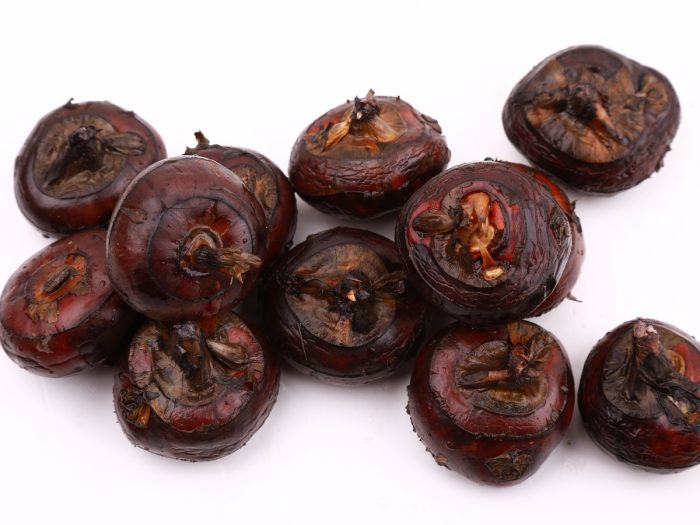The amazing health benefits of water chestnuts include their ability to aid in weight loss, lower blood pressure, increase red blood cell production, prevent heart diseases, and increase immunity.
What Are Water Chestnuts?
Water chestnuts (Eleocharis dulcis) are not nuts but tuber vegetables that grow in marshes, ponds, and shallow lakes. The tuber vegetables are also known as corms. These small, white, round corms are crisp and sweet and have a thick, dark brown skin. They are native to Asia (India, China, Japan, Indonesia), Australia, Africa, and certain islands in the Pacific and Indian Oceans. They are popular in Chinese cuisine and are often called Chinese water chestnuts. The corms can be eaten raw as well as cooked. In Indonesia, they are blended and made into a delicious, healthy drink. [1]
Water chestnuts are often confused with water caltrops (Trapa natans). However, water caltrops are not sweet; they taste like potatoes and are shaped like bats.

Chinese water chestnuts Photo Credit: Shutterstock
Serving Size : Nutrient Value Total lipid (fat) [g] 0.09 Carbohydrate, by difference [g] 19.22 Energy 78 Water [g] 78.78 Sugars, total including NLEA [g] 3.84 Fiber, total dietary [g] 3.9 Calcium, Ca [mg] 6 Iron, Fe [mg] 1.36 Magnesium, Mg [mg] 8 Phosphorus, P [mg] 30 Potassium, K [mg] 184 Sodium, Na [mg] 12 Zinc, Zn [mg] 0.59 Copper, Cu [mg] 0.16 Selenium, Se [µg] 1.1 Vitamin E (alpha-tocopherol) [mg] 0.78 Vitamin C, total ascorbic acid [mg] 2 Thiamin [mg] 0.02 Riboflavin [mg] 0.04 Niacin [mg] 0.56 Vitamin B-6 [mg] 0.25 Folate, total [µg] 9 Choline, total [mg] 28.9 Vitamin K (phylloquinone) [µg] 0.3 Folate, food [µg] 9 Folate, DFE [µg] 9 Fatty acids, total saturated [g] 0.03 10:0 [g] 0 12:0 [g] 0 14:0 [g] 0 16:0 [g] 0.02 18:0 [g] 0 18:1 [g] 0 18:2 [g] 0.03 18:3 [g] 0.01 16:1 [g] 0 Fatty acids, total monounsaturated [g] 0 Fatty acids, total polyunsaturated [g] 0.04 Sources include : USDA [2]
Nutrition
Water chestnuts are rich in carbohydrates, starch, and dietary fiber. They are a good source of vitamin B6, riboflavin, copper, manganese, and potassium. They have high water content. [3]
Health Benefits
Let us look at the top health benefits of water chestnuts.
Rich in Antioxidants
Water chestnuts are a rich source of phenolic compounds and flavonoids such as catechin gallate, epicatechin gallate, and gallocatechin gallate. The antioxidants help scavenge free radicals in the body, preventing oxidative stress and inhibiting the progression of chronic diseases. [4]
Lower Blood Pressure
The high potassium content in water chestnuts helps reduce the blood pressure levels in the body. Potassium acts as a vasodilator and helps dilate blood vessels, ensuring a smooth blood circulation in the body. Diets rich in potassium have been positively linked to lower risk of heart ailments and strokes. [5]
Prevent Heart Diseases
Water chestnuts help decrease the incidence of heart diseases in two ways. They help reduce water retention by regulating sodium levels in the body and they reduce the incidence of hypertension. They contain no cholesterol, only a trace of fat, and have a fraction of the calories of other nuts, such as cashew nuts and peanuts. [6]
Weight Loss
Water chestnuts do not contain cholesterol and fat and are rich in dietary fiber. These crisp, crunchy vegetables are low in calories and are best had in soups and stir-fries. With their nutrient-rich profile, they make an excellent addition to any weight loss regimen.
Help Fight Cancer
Water chestnuts help fight gastric as well as breast cancer by helping inhibit the multiplication of cancerous cells and stop the spread of cancerous growth in the body. [7]
Increase Immunity Levels
The chestnut fruit and peel contain an antibiotic compound called puchin which acts like penicillin. According to a study, the peels can be used as a food supplement to kill foodborne bacteria. [8] [9]
Other Benefits
- In Chinese medicine, they are used as a remedy to strengthen the stomach and increase overall vigor.
- They also contain high levels of folate which is beneficial for pregnant women.
- Flour made from chestnuts is naturally gluten-free and high in protein. In Chinese traditional medicine, the flour is mixed with water and given to reduce nausea and ease the discomfort caused due to jaundice and measles.
How To Use Water Chestnuts?
You can buy fresh or canned water chestnuts and they can be used in a number of ways such as:
- They can be eaten raw, steamed, boiled, or roasted but have to be peeled.
- They can be added to soups, stir-fries, noodles, or rice dishes.
- Chestnut flour can be used to make pasta, noodles, and as a thickener.
- Minced water chestnut is used to make puddings and cakes.
- They can be blended into a healthy juice.
Word of caution: Water chestnuts can cause vomiting and nausea if eaten in excess.
